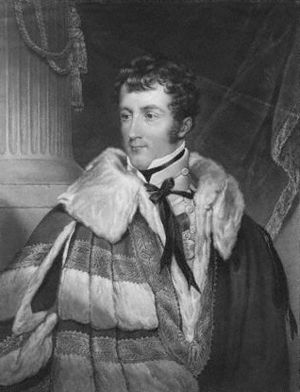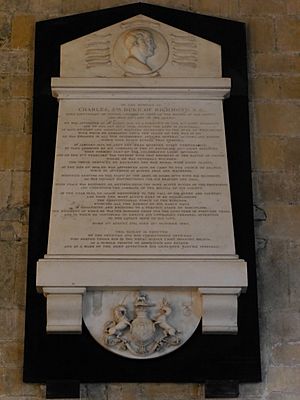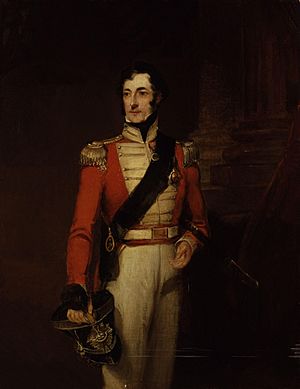Charles Gordon-Lennox, 5th Duke of Richmond facts for kids
Quick facts for kids
The Duke of Richmond and Lennox
|
|
|---|---|

The Duke of Richmond, 1824.
|
|
| Postmaster General | |
| In office 11 December 1830 – 5 July 1834 |
|
| Prime Minister | The Earl Grey |
| Preceded by | The Duke of Manchester |
| Succeeded by | The Marquess Conyngham |
| Member of the House of Lords Lord Temporal |
|
| In office 28 August 1819 – 21 October 1860 Hereditary peerage |
|
| Preceded by | The 4th Duke of Richmond |
| Succeeded by | The 6th Duke of Richmond |
| Member of Parliament for Chichester |
|
| In office 1812–1819 |
|
| Preceded by | George White-Thomas |
| Succeeded by | Lord John Lennox |
| Personal details | |
| Born |
Charles Lennox
3 August 1791 Richmond House, Whitehall Gardens, London |
| Died | October 21, 1860 (aged 69) Portland Place, Marylebone, London |
| Nationality | British |
| Political party | Ultra-Tories |
| Spouse | Lady Caroline Paget (1796–1874) |
| Children |
|
| Parents | Charles Lennox, 4th Duke of Richmond Lady Charlotte Gordon |
| Alma mater | Trinity College, Dublin |

Charles Gordon-Lennox, 5th Duke of Richmond (born Charles Lennox; 3 August 1791 – 21 October 1860) was an important British noble, soldier, and politician. He lived at Goodwood House near Chichester in West Sussex. He was a key member of the Conservative Party.
Contents
Who Was Charles Gordon-Lennox?
Charles Lennox was born in 1791. His father was Charles Lennox, 4th Duke of Richmond. His mother was Lady Charlotte Gordon. She was the oldest child of Alexander Gordon, 4th Duke of Gordon. Before his father passed away in 1819, Charles was known as the Earl of March. This was a special title given to him as the heir.
Education and Early Life
Charles went to school at Westminster School in London. He then studied at Trinity College, Dublin. These schools helped him prepare for his future roles.
A Brave Soldier
Charles Gordon-Lennox had a brave military career. He served in several important wars.
Fighting in Wars
As the Earl of March, he worked with Wellington during the Peninsular War. He bravely volunteered to join a special attack group at the Siege of Ciudad Rodrigo. This was a very dangerous mission.
In 1813, he officially joined the 52nd Foot regiment. He led a group of soldiers at the Battle of Orthez in 1814. He was badly hurt there, with a musket-ball staying in his chest. During the famous Battle of Waterloo in 1815, he was an aide-de-camp (a personal assistant) to the Prince of Orange. After the Prince was wounded, Charles became Wellington's aide-de-camp.
Honoring Soldiers
Charles was very important in creating the Military General Service Medal in 1847. This medal was given to soldiers who fought in campaigns between 1793 and 1814. Many felt this honor was long overdue. He worked hard in Parliament and got Queen Victoria interested in the idea. Charles himself received this medal with eight special clasps, showing his many battles.
He also helped restart the Goodwood Troop of Yeomanry Artillery in 1817. He later became a Colonel in the Royal Sussex Light Infantry Militia.
A Career in Politics
Charles Gordon-Lennox was also a very active politician. He held several important positions.
Serving in Parliament
From 1812 to 1819, Charles was a Member of Parliament for Chichester. This meant he represented the people of Chichester in the government.
In 1819, he became the Duke of Richmond after his father's death. This allowed him to join the House of Lords. This is the upper house of the UK Parliament. He strongly disagreed with allowing Roman Catholics more rights. He also opposed Peel's ideas about free trade. He was the president of a group that wanted to keep the Corn Laws. These laws protected British farmers by taxing imported grain.
Even though he was mostly a strong Conservative, he joined a different government in 1830. This was because he was upset with Wellington over the Catholic Emancipation issue.
Important Government Roles
From 1830 to 1834, he served as the Postmaster General. This role was in charge of the postal service. In 1830, he also joined the Privy Council. This is a group of advisors to the King or Queen.
He was also the Lord Lieutenant of Sussex from 1835 to 1860. This was a high-ranking official representing the monarch in the county. In 1829, he was made a Knight of the Garter. This is a very special honor.
In 1836, he inherited land from his uncle. Because of this, he added "Gordon" to his last name, becoming Gordon-Lennox.
Family Life
On 10 April 1817, Charles married Lady Caroline Paget. Together, they had ten children: five sons and five daughters.
Sons
- Charles Gordon-Lennox, 6th Duke of Richmond (1818–1903), who became the next Duke.
- Fitzroy George Charles Gordon-Lennox (1820–1841), who was lost at sea.
- Lord Henry Charles George Gordon-Lennox (1821–1886).
- Lord Alexander Francis Charles Gordon-Lennox (1825–1892).
- Lord George Charles Gordon-Lennox (1829–1877).
Daughters
- Lady Caroline Amelia Gordon-Lennox (1819–1890).
- Lady Augusta Catherine Gordon-Lennox (1827–1904).
- Lady Cecilia Catherine Gordon-Lennox (1838–1910).
Later Life and Legacy
Charles Gordon-Lennox passed away in London in October 1860. He was 69 years old. His eldest son, Charles Gordon-Lennox, 6th Duke of Richmond, became the next Duke.
See also
- Duchess of Richmond's Ball
 | James B. Knighten |
 | Azellia White |
 | Willa Brown |


